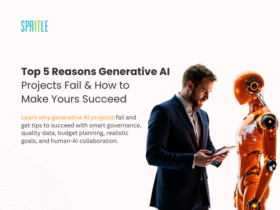In today’s fast-paced digital world, understanding your customers is more crucial than ever. Imagine having a magical crystal ball that reveals their needs, preferences, and behaviors. This is exactly what AI-powered customer insights offer—a transformative tool that turns data into actionable intelligence.
AI is not just a futuristic concept; it’s a present-day solution that helps decode customer feedback and uncover hidden patterns in consumer behavior. By rapidly analyzing vast amounts of unstructured data, AI acts like a digital crystal ball, providing businesses with the insights they need to make informed decisions.
From telecom to e-commerce, industries are leveraging AI to enhance customer experiences. For instance, Netflix uses predictive analytics to shape content decisions based on viewing habits, while Microsoft employs AI to personalize product recommendations. These real-world examples highlight how AI is revolutionizing data-driven marketing strategies.
By bridging the gap between traditional and modern marketing approaches, AI empowers businesses to build stronger, customer-centric experiences. This guide will explore the tools, techniques, and emerging trends that are shaping the future of customer insights and data-driven marketing.
Key Takeaways
- AI transforms customer insights by decoding feedback and uncovering hidden data patterns.
- AI acts as a digital crystal ball, enabling businesses to make informed, data-driven decisions.
- Industries like telecom, e-commerce, and streaming services are leveraging AI to enhance customer experiences.
- AI bridges the gap between traditional and modern marketing strategies, fostering customer-centric approaches.
- This guide explores tools, techniques, and trends shaping the future of data-driven marketing.
Introduction to AI Customer Insights
In the dynamic landscape of modern marketing, understanding consumer preferences is vital. AI customer insights represent a powerful tool that transforms raw data into actionable intelligence, helping businesses make informed decisions.
What Are AI Customer Insights?
AI customer insights are derived from advanced analysis of consumer data, offering deep understanding of behaviors and preferences. This technology processes vast amounts of information from various sources, including social media and feedback, to uncover patterns that traditional methods often miss.
The Shift from Traditional to Data-Driven Marketing
Traditional marketing relied on surveys and focus groups, which are time-consuming and often incomplete. AI accelerates this process by analyzing data in real-time, providing insights that enable businesses to adapt quickly to market changes. For instance, AI can predict consumer trends, allowing companies to tailor their strategies for better engagement and conversion.
By embracing AI, businesses can move beyond guesswork and build strategies rooted in data. This shift not only enhances efficiency but also fosters a more customer-centric approach, driving growth and satisfaction.
The Power of AI in Analyzing Customer Data
In the fast-evolving digital landscape, businesses are constantly seeking ways to turn raw data into meaningful strategies. AI emerges as a powerful tool that excels in analyzing vast amounts of customer information, unlocking hidden patterns that might elude human analysts.
Centralizing and Interpreting Unstructured Data
AI’s ability to centralize unstructured data from sources like social media, emails, and calls is transformative. By decoding this information, AI uncovers trends that traditional methods often miss, providing businesses with a clearer understanding of consumer behavior and preferences.
Predictive Analytics for Anticipating Consumer Needs
Predictive analytics is another key strength of AI. By analyzing historical data and market trends, AI can forecast future consumer needs with remarkable accuracy. For instance, telecom companies use AI to detect network issues before they affect users, while e-commerce platforms leverage it to personalize product recommendations based on browsing habits.
| Industry | AI Application | Benefit |
|---|---|---|
| Telecom | Predictive maintenance | Reduces service disruptions |
| E-commerce | Personalized recommendations | Increases conversion rates |
| Retail | Inventory management | Optimizes stock levels |

By integrating AI into their strategies, businesses can make faster, more informed decisions. This not only enhances operational efficiency but also leads to more satisfied customers and stronger brand loyalty.
Real-World Success Stories in AI-Driven Marketing
From telecom to e-commerce, AI is reshaping industries through enhanced customer interaction and real-time data processing. These innovations are driving significant improvements in consumer satisfaction and business efficiency.
Telco and Call Center Innovations
Telecom companies are leveraging AI to detect and resolve network issues before they affect users. For instance, AI-powered systems can predict service disruptions, allowing companies to take proactive measures. This approach has significantly reduced downtime and improved consumer satisfaction. Similarly, call centers are using AI to analyze customer feedback in real-time, enabling faster resolution of issues and enhancing overall user experience.
E-Commerce Insights and Social Media Trends
In the e-commerce sector, companies like Netflix are setting benchmarks with their AI-driven recommendation systems. By analyzing viewing habits, Netflix personalizes content suggestions, leading to higher engagement rates. Walmart has also embraced AI for inventory management, optimizing stock levels based on consumer trends and seasonality. These strategies not only improve efficiency but also ensure that product offerings align with market demands.
Moreover, AI is transforming social media marketing. Platforms are using sentiment analysis to gauge consumer sentiment, enabling brands to refine their strategies. For example, Coca-Cola used AI to create personalized ad variations, resulting in higher engagement across different demographics. These real-world applications demonstrate how AI is becoming an indispensable tool for businesses aiming to stay ahead in competitive markets.
By integrating AI into their operations, companies like Netflix and Microsoft are not only enhancing customer satisfaction but also gaining a competitive edge. These success stories underscore the transformative potential of AI in driving data-driven marketing strategies and fostering long-term growth.
Learn moreabout how AI is revolutionizing marketing andconsumerinteractions.
AI customer insights: Tools and Techniques for Data-Driven Decisions
Modern businesses rely on advanced tools to turn data into actionable strategies. AI-powered solutions are at the forefront of this transformation, offering unique techniques to enhance decision-making.
Utilizing Sentiment Analysis and Visual Feedback
Sentiment analysis is a game-changer for understanding consumer emotions. By analyzing text data, businesses can gauge public sentiment and adjust their strategies accordingly. Visual feedback tools add another layer, converting complex data into easy-to-understand visuals for faster insights.
For instance, Netflix uses sentiment analysis to refine its recommendations, ensuring users find content that resonates with them. This approach boosts engagement and satisfaction, setting a benchmark for the industry.
Streamlining Data Collection with AI-Powered Platforms
AI platforms automate and centralize data collection, making it easier to manage vast amounts of information. These tools process data from various sources, providing a unified view that informs strategic decisions.
Usersnap’s AI features, such as response suggestions and categorization, exemplify this. They help teams act quickly on feedback, improving products and services efficiently.
| Tool | Feature | Benefit |
|---|---|---|
| Netflix | Sentiment Analysis | Personalized Recommendations |
| Usersnap | AI Summarization | Efficient Feedback Handling |
| Qualtrics | Sentiment Analysis | Emotion Trend Identification |
By integrating these tools, businesses can make data-driven decisions, enhance customer experiences, and stay competitive. Learn more about how these solutions can transform your strategy.

Overcoming Challenges in Implementing AI Insights
As businesses embrace AI for deeper consumer understanding, they face unique challenges. One major issue is data bias, which can skew insights and lead to flawed decisions. According to McKinsey, biased data can result in unfair outcomes, affecting both individuals and businesses. Ensuring the accuracy of AI systems is crucial for reliable results.
Addressing Data Bias and Ensuring Accuracy
Data bias often stems from unrepresentative or skewed datasets. To combat this, businesses must validate AI outputs with human oversight, as suggested by Deloitte. Regular audits and diverse training data can help mitigate these biases, ensuring more balanced and accurate insights.
Balancing Human Judgment with AI Automation
While AI excels at processing large datasets, human intuition remains essential. Companies should use AI as a support tool rather than relying solely on automation. This hybrid approach allows teams to refine AI-generated insights with their expertise, leading to more informed decisions.
Continuous monitoring is key to maintaining data integrity. By combining the efficiency of AI with human oversight, businesses can harness the power of data while avoiding potential pitfalls. This balanced strategy fosters trust and ensures long-term success in data-driven marketing.
Learn more about how to integrate AI effectively while maintaining data integrity by visiting our privacy policy page.
Emerging Trends in AI and Consumer Understanding
As we navigate the ever-changing landscape of technology, AI is paving the way for innovative approaches in understanding and engaging with consumers. These advancements are reshaping how businesses interact with their audiences, creating more personalized and responsive strategies.
Hyper-Personalization in Marketing Campaigns
Hyper-personalization is revolutionizing marketing by tailoring experiences to individual preferences at an unprecedented level. Netflix and Spotify exemplify this trend, using AI to analyze user behavior and deliver personalized recommendations. This approach not only enhances user satisfaction but also fosters brand loyalty. For instance, Netflix’s recommendation engine, powered by AI, ensures users find content that resonates with them, significantly boosting engagement and retention.
Real-Time Feedback and Agile Decision-Making
Real-time feedback mechanisms are enabling businesses to adapt swiftly to changing consumer needs. Companies like Kraft Heinz and Nestlé are leveraging AI to gather and analyze data from various touchpoints, allowing them to make informed decisions quickly. This agility not only improves operational efficiency but also ensures that brands remain relevant in dynamic markets. By integrating real-time insights, businesses can respond promptly to market shifts, creating a competitive edge.
Conclusion
As we explore the transformative potential of technology in understanding consumer behavior, it becomes clear that data-driven strategies are the cornerstone of modern business success. Centralizing information and leveraging advanced tools like Usersnap’s visual feedback platform empower companies to make informed decisions, driving growth and innovation.
From real-world success stories to emerging trends, AI has proven its ability to enhance marketing efforts and improve consumer satisfaction. By combining human expertise with automated solutions, businesses can overcome challenges and unlock new opportunities for engagement and personalization.
Don’t miss the chance to elevate your strategy with cutting-edge tools. Start your journey with Usersnap’s free trial and discover how visual feedback can transform your approach to product development and customer experience. Join the ranks of forward-thinking companies that are already reaping the benefits of data-driven insights.












